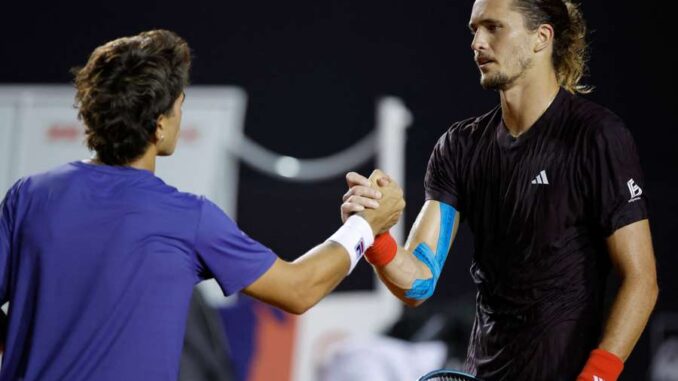
The vibrant clay courts of the ATP Rio Open witnessed a seismic upset, a moment that sent shockwaves through the tennis world. Francisco Comesana, a player whose name resonated primarily within the confines of the challenger circuit, delivered a stunning performance, dismantling the formidable Alexander Zverev.1 The unexpected victory sparked a flurry of analysis, with commentators and fans alike grappling with the implications of this remarkable result.
Zverev, a titan of the game, entered the tournament with expectations befitting his stature. His powerful serve, coupled with his formidable groundstrokes, had established him as a dominant force on the tour. However, the clay courts of Rio proved to be a battleground where expectations were overturned, and the unexpected occurred.
Comesana, a player who had diligently worked his way through the ranks, seized the opportunity presented before him. His performance was characterized by a blend of tenacity and tactical brilliance, a testament to his dedication and preparation. He approached the match with a level of composure that belied his relative inexperience at this level of competition.
The match unfolded with a narrative of unexpected shifts in momentum. Comesana’s ability to absorb Zverev’s power and redirect it with precision proved to be a crucial factor. His groundstrokes, delivered with consistency and depth, consistently troubled Zverev, disrupting his rhythm and forcing him into uncharacteristic errors.
“I just tried to stay focused on every point,” Comesana said, reflecting on his mental approach. “I knew I had to be patient and wait for my opportunities.” His words revealed a strategic mindset, a recognition of the need to capitalize on any vulnerabilities that Zverev might present.
Zverev, on the other hand, appeared to struggle with his consistency. His serve, typically a weapon of formidable power, lacked its usual precision. His groundstrokes, often delivered with devastating force, were marred by unforced errors. The frustration was palpable, and the German’s body language reflected a growing sense of unease.
“I wasn’t able to find my rhythm,” Zverev admitted, his words conveying a sense of disappointment. “I made too many mistakes, and my opponent played very well.” His honesty highlighted the challenges he faced in adapting to the conditions and the pressure exerted by Comesana.
The clay courts of Rio, known for their demanding nature, presented a unique set of challenges. The surface, which requires a high level of precision and consistency, can be unforgiving to players who are not at their best. Comesana’s ability to adapt to the conditions proved to be a crucial factor in his victory.
The atmosphere in the stadium was electric, with the crowd fully engaged in the unfolding drama. The energy of the spectators seemed to fuel Comesana’s performance, adding an extra layer of intensity to the match. The crowd’s support was a clear advantage for the player who was considered the underdog.
The victory represented a significant milestone in Comesana’s career, a moment that would undoubtedly elevate his confidence and provide a platform for further success. It also served as a reminder of the unpredictable nature of professional tennis, where even the most dominant players can be vulnerable to upsets.
The implications of the result extended beyond the immediate match. Zverev’s early exit raised questions about his form and his preparation for the upcoming clay-court season. The pursuit of major titles on clay requires peak performance, and any lapses in consistency can be costly.
The tennis community now watched with keen interest, eager to see how Comesana would build upon his remarkable victory. His ability to maintain his focus and consistency would be crucial to his future success. The match was a demonstration of how important focus, and mental strength are in the game of tennis.
The upset also highlighted the depth of talent within the tennis tour. The rise of players from the challenger circuit, who are capable of challenging and defeating established stars, is a testament to the increasing competitiveness of the sport.
The story of Francisco Comesana’s victory over Alexander Zverev serves as a reminder that in the world of tennis, anything is possible. The pursuit of excellence is a journey marked by both triumphs and setbacks, and the ability to persevere and seize opportunities is a hallmark of true champions. The match was a clear example of the beauty of the sport, and how any player can win on any given day.
Leave a Reply